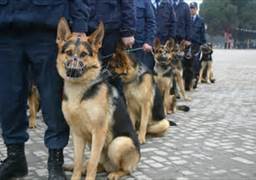 Dogs might be better known as mans best friend, but they’re also invaluable on the battlefield. Nearly 60 have been killed in action while saving countless numbers of their human platoon members. Those dogs are getting their due as more groups establish memorials to canines that have fallen.
Dogs might be better known as mans best friend, but they’re also invaluable on the battlefield. Nearly 60 have been killed in action while saving countless numbers of their human platoon members. Those dogs are getting their due as more groups establish memorials to canines that have fallen.
Special Operations Forces handle a majority of the canine units that serve alongside their human handlers. These dogs are trained to be sentries, bomb dogs and to sniff out enemy combatants. Once retired, these dogs of war are allowed to return home with their handler and be a part of the family back in the U.S.
Beginning in 2009 a member of the Special Operations Forces (SOF) kennel began tracking the dogs of war that perished on the battlefield. The SOF would pay for grave markers for these fallen four-legged heroes, but recently they decided to honor them with a special tribute to them. Members of the SOF raised money to get a permanent memorial to dogs of war built at the Airborne and Special Operations Museum near Fort Bragg in North Carolina.
The use of canines in war is not a new development. Ancient Egyptians used them. The U.S. utilized dogs of war in World War II. They are common companions to police forces, big and small, across the nation. There are approximately 2,000 dogs of war currently in service for the U.S. Military. The most common breads are German shepherds, Blgian Malinois and Dutch shepherds. These dogs are the cream of the crop as most that are tested for battle duty cannot live up to the expectations of the trainer.
The SEAL team that took down Osama bin Laden was accompanied by a Belgian Malinois named Cairo. To recognize Cairo and thousands of dogs like him, an artist sculpted a life-size bronze replica of a Belgian Malinois wearing a combat vest. The statue/memorial was unveiled in July to great fanfare from dog lovers and military veterans whose lives have been touched or even saved by these extraordinary canines. The bronze statue of the dog is erected facing a statue of a paratrooper known as “Iron Mike.” The memorial is the center piece of an area that is surrounded by granite pavers that are engraved with the names and information regarding dogs of war that died in action.
One of the breeds most often chosen to serve on the front lines, the German Shepherd is prone to suffering from joint pain. ProLabs is focused on improving canine joint health and has developed FLEX Rx , a joint supplement that has been shown to be more effective than the traditional glucosamine hydrochloride method. ProLabs joins with the thousands of servicemen and women who have been assisted or saved by these canines, to honor these special dogs and to help provide top products to keep these dogs healthy and ready to serve.
